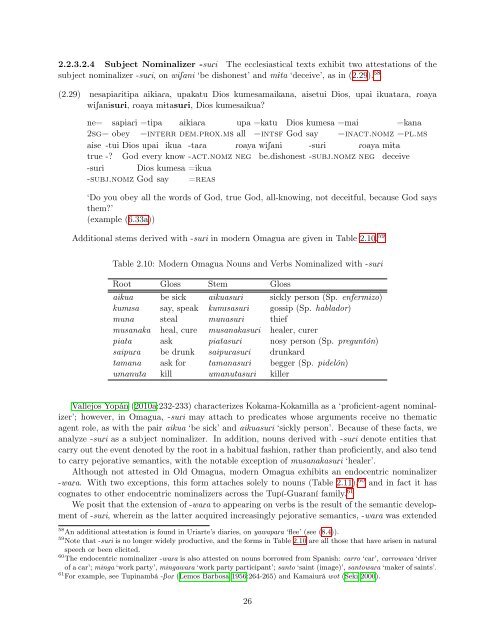draft manuscript - Linguistics - University of California, Berkeley
draft manuscript - Linguistics - University of California, Berkeley
draft manuscript - Linguistics - University of California, Berkeley
You also want an ePaper? Increase the reach of your titles
YUMPU automatically turns print PDFs into web optimized ePapers that Google loves.
2.2.3.2.4 Subject Nominalizer -suRi The ecclesiastical texts exhibit two attestations <strong>of</strong> the<br />
subject nominalizer -suRi, on wiSani ‘be dishonest’ and m1ta ‘deceive’, as in (2.29). 58<br />
(2.29) nesapiaRitipa aikiaRa, upakatu Dios kumesamaikana, aisetui Dios, upai ikuataRa, Roaya<br />
wiSanisuRi, Roaya m1tasuRi, Dios kumesaikua?<br />
ne= sapiaRi =tipa aikiaRa upa =katu<br />
2sg= obey =interr dem.prox.ms all =intsf<br />
aise -tui Dios upai ikua -taRa Roaya<br />
true -? God every know -act.nomz neg<br />
-suRi Dios kumesa =ikua<br />
-subj.nomz God say =reas<br />
wiSani<br />
be.dishonest<br />
Dios kumesa<br />
God say<br />
-suRi<br />
-subj.nomz<br />
=mai =kana<br />
=inact.nomz =pl.ms<br />
Roaya m1ta<br />
neg deceive<br />
‘Do you obey all the words <strong>of</strong> God, true God, all-knowing, not deceitful, because God says<br />
them?’<br />
(example (6.33a))<br />
Additional stems derived with -suRi in modern Omagua are given in Table 2.10. 59<br />
Table 2.10: Modern Omagua Nouns and Verbs Nominalized with -suRi<br />
Root Gloss Stem Gloss<br />
aikua be sick aikuasuRi sickly person (Sp. enfermizo)<br />
kumIsa say, speak kumIsasuRi gossip (Sp. hablador)<br />
muna steal munasuRi thief<br />
musanaka heal, cure musanakasuRi healer, curer<br />
piata ask piatasuRi nosy person (Sp. preguntón)<br />
saipuRa be drunk saipuRasuRi drunkard<br />
tamana ask for tamanasuRi begger (Sp. pidelón)<br />
umanuta kill umanutasuRi killer<br />
Vallejos Yopán (2010a:232-233) characterizes Kokama-Kokamilla as a ‘pr<strong>of</strong>icient-agent nominalizer’;<br />
however, in Omagua, -suRi may attach to predicates whose arguments receive no thematic<br />
agent role, as with the pair aikua ‘be sick’ and aikuasuRi ‘sickly person’. Because <strong>of</strong> these facts, we<br />
analyze -suRi as a subject nominalizer. In addition, nouns derived with -suRi denote entities that<br />
carry out the event denoted by the root in a habitual fashion, rather than pr<strong>of</strong>iciently, and also tend<br />
to carry pejorative semantics, with the notable exception <strong>of</strong> musanakasuRi ‘healer’.<br />
Although not attested in Old Omagua, modern Omagua exhibits an endocentric nominalizer<br />
-waRa. With two exceptions, this form attaches solely to nouns (Table 2.11), 60 and in fact it has<br />
cognates to other endocentric nominalizers across the Tupí-Guaraní family. 61<br />
We posit that the extension <strong>of</strong> -waRa to appearing on verbs is the result <strong>of</strong> the semantic development<br />
<strong>of</strong> -suRi, wherein as the latter acquired increasingly pejorative semantics, -waRa was extended<br />
58 An additional attestation is found in Uriarte’s diaries, on yawapaRa ‘flee’ (see (8.4)).<br />
59 Note that -suRi is no longer widely productive, and the forms in Table 2.10 are all those that have arisen in natural<br />
speech or been elicited.<br />
60 The endocentric nominalizer -waRa is also attested on nouns borrowed from Spanish: carro ‘car’, carrowaRa ‘driver<br />
<strong>of</strong> a car’; minga ‘work party’, mingawaRa ‘work party participant’; santo ‘saint (image)’, santowaRa ‘maker <strong>of</strong> saints’.<br />
61 For example, see Tupinambá -BoR (Lemos Barbosa 1956:264-265) and Kamaiurá wot (Seki 2000).<br />
26
















